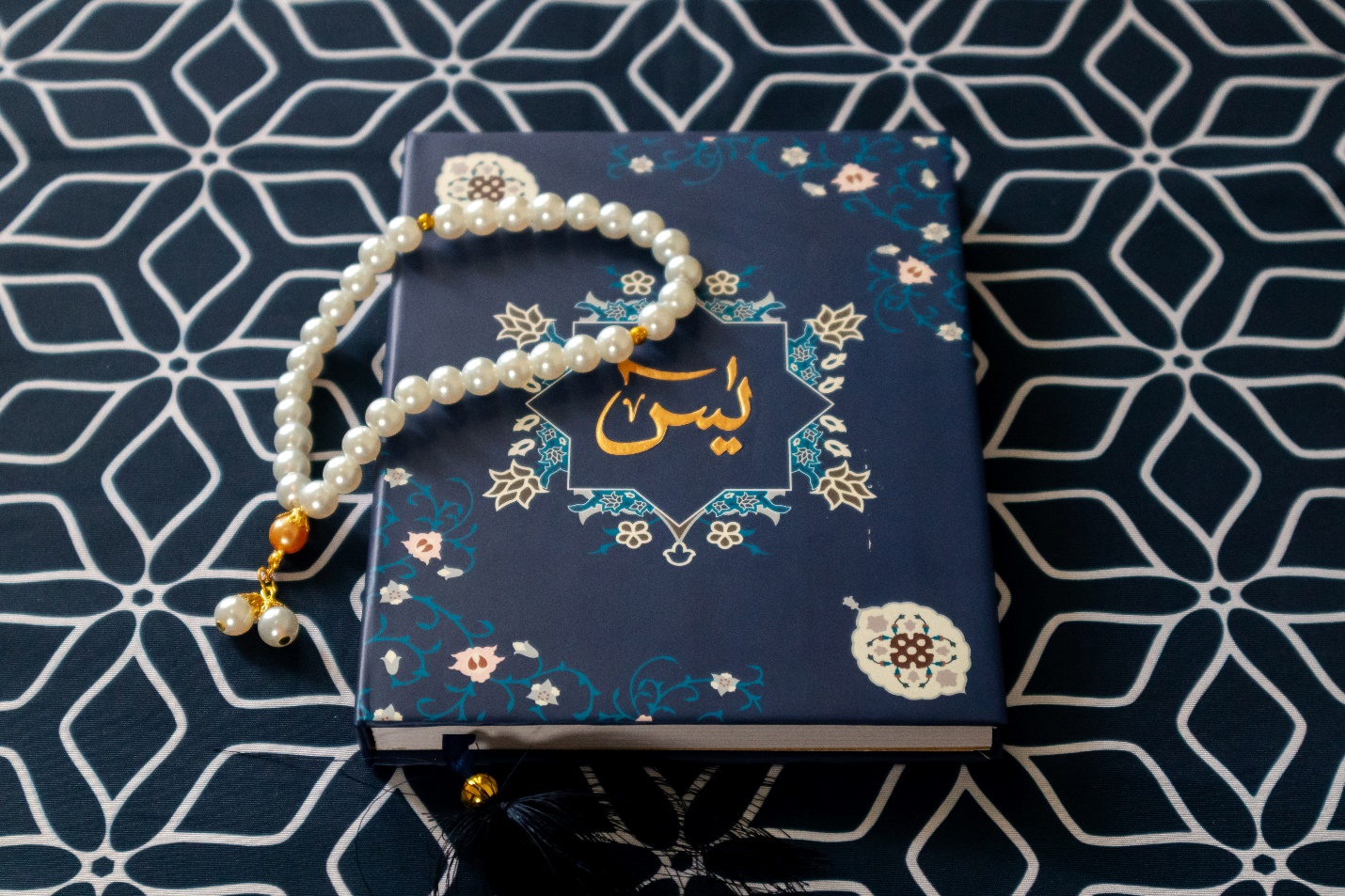Blog
Surah Yasin: The Power of Reciting It During Times of Difficulty

As Muslims, many of us have grown up hearing about the power of Surah Yasin — often called the heart of the Quran. Our elders tell us that reciting this chapter brings blessings, forgiveness, and divine help, especially during times of hardship. Many memorize it and turn to it whenever life becomes challenging. But why is Surah Yasin so special? And how exactly does reciting it help ease difficulty? This article explores the profound spiritual significance of Surah Yasin and why it is a source of comfort and strength for believers facing trials.
What is Surah Yasin and Why is It Called the “Heart of the Quran”?
Surah Yasin is the 36th chapter of the Quran, containing 83 eloquent verses revealed in Mecca. It focuses on fundamental themes such as the oneness of Allah, the prophethood of Muhammad (PBUH), resurrection, accountability, mercy, and the Day of Judgment. The chapter begins with the mysterious letters “Ya Sin” and highlights the role of the Prophet as Allah’s final messenger.
The Prophet Muhammad (PBUH) said:
“Indeed for everything, there is a heart, and the Qur’an’s heart is Ya Sin. Whoever recites Ya Sin, then for its recitation, Allah writes for him that he recited the Qur’an ten times.”
— [Jami` at-Tirmidhi 2887]
This hadith emphasizes Surah Yasin’s central role in encapsulating the Quran’s core message, making it a spiritual cornerstone for Muslims worldwide.
Spiritual Benefits of Reciting Surah Yasin
The benefits of Surah Yasin are deeply rooted in Islamic tradition and spirituality:
- Ease of Hardships: Reciting it invites relief from difficulties and reassures the believer.
- Forgiveness and Mercy: It brings Allah’s forgiveness and abundant mercy.
- Spiritual Protection: It shields from both worldly and spiritual adversities.
- Comfort at Life’s End: The Prophet advised reciting it for those nearing death to ease their transition.
- Peace and Healing: Its rhythmic verses calm the soul and foster emotional resilience.
Surah Yasin as a Source of Comfort and Hope
When facing tough times, Surah Yasin serves as a profound source of comfort. It reminds believers that hardships are temporary and that Allah’s mercy and justice prevail. One verse offers immense reassurance:
“It is We indeed who bring back the dead to life, and write down what they send ahead (of their deeds), and traces that they leave behind. We keep an account of all things in a lucid register.”
— [Al-Quran 36:12]
This verse highlights Allah’s infinite knowledge and the importance of patience. No deed or struggle goes unnoticed, and rewards will follow perseverance.
The Promise of Ease After Hardship
A recurring theme in Surah Yasin is Allah’s mercy and the promise of relief after difficulty. Verses 33-35 beautifully illustrate this using nature’s example:
“There is a sign in the dead earth for them which We quicken, and produce from it grain which they eat.”
— [Al-Quran 36:33]
Just as barren land is revived by rain, human difficulties are temporary and will be followed by ease. This metaphor inspires hope and renewal even in the darkest moments.
Protection From Worldly and Spiritual Adversities
Surah Yasin offers protection in times of distress. The Prophet (PBUH) said:
“Recite Surah Ya-Sin over your dying men.”
— [Sunan Abi Dawud 3121]
This practice reflects its power to ease transitions from this life to the hereafter and reduce anxiety during trials.
Strengthening Faith Through Tawakkul (Trust in Allah)
Surah Yasin stresses reliance on Allah’s wisdom and plan — a concept known as Tawakkul. During hardship, doubts and questions may arise, but the surah reminds believers to trust Allah fully. The stories of past messengers in Surah Yasin exemplify steadfastness despite rejection:
“(The messengers) said: ‘Our Lord knows that we have been sent to you. Our duty is to convey the message clearly.'”
— [Al-Quran 36:16-17]
The messengers’ patience and faith inspire believers to remain hopeful and trust Allah’s greater wisdom.
Forgiveness and Infinite Mercy
Another beautiful aspect of Surah Yasin is its assurance of Allah’s mercy:
“Peace” shall be the greeting from the merciful Lord.
— [Al-Quran 36:58]
This verse reassures that those who remain patient and faithful will receive the ultimate reward — eternal peace and mercy.
Immediate Relief and Spiritual Healing
Reciting Surah Yasin brings immediate relief through Allah’s divine intervention. The soothing rhythm and profound meanings help heal the soul, reduce stress, and build a deep connection with Allah. It serves as a spiritual balm amid worldly challenges.
Scientific Perspective on Quranic Recitation
Studies on Quranic recitation reveal its calming effect on the nervous system, helping reduce anxiety and promote emotional well-being. This scientific insight aligns with traditional Islamic teachings about the therapeutic power of Surah Yasin.
How to Recite Surah Yasin for Maximum Benefit
- Begin with sincere intention (niyyah) to seek Allah’s mercy and support.
- Recite regularly, especially on Fridays or during tough times.
- Reflect on its meanings to deepen understanding and faith.
- Accompany recitation with dua (supplication) for relief and guidance.
Common Misconceptions
- Surah Yasin is not a magic spell; it complements practical efforts.
- Benefits are greatest when recited with true belief and understanding.
- It supports healing, but medical help should not be ignored.
Conclusion: Surah Yasin as a Beacon of Hope
Surah Yasin is far more than just a chapter of the Quran — it is a source of strength, guidance, and peace for Muslims facing trials. It constantly reminds us of Allah’s mercy, forgiveness, and supreme control over all matters:
“When He wills a thing He has only to say: ‘Be,’ and it is.”
— [Al-Quran 36:82]
Believers who turn to Surah Yasin with faith and sincerity find comfort in knowing that every hardship will pass, and with Allah’s will comes ease and tranquility.
Blog
What Breaks Wudu

In Islam, Wudu (Ablution) is a ritual purification required before performing acts of worship such as Salah (prayer), reciting the Quran, and entering a mosque. Wudu is not only a physical cleansing but also a spiritual preparation, ensuring a Muslim is in a state of purity before standing before Allah.
Allah says:
“O you who believe! When you intend to pray, wash your faces and your hands up to the elbows, and wipe your heads, and your feet up to the ankles.”
(Surah Al-Ma’idah 5:6)
Maintaining Wudu is essential because prayers performed without it may not be valid. Understanding what breaks Wudu helps Muslims remain in a state of ritual purity and strengthens their spiritual connection with Allah.
1. Definition and Significance of Wudu
Wudu is the ritual washing of specific body parts before prayers or other acts of worship. Its significance includes:
- Spiritual purification: Removes minor sins and prepares the heart for worship.
- Physical cleanliness: Promotes hygiene and prevents infections.
- Obedience to Allah: Fulfills a commandment outlined in the Quran.
Prophet Muhammad ﷺ said:
“The prayer of a person who does not perform Wudu properly will not be accepted until he performs it correctly.”
(Sahih Muslim 232)
2. Essential Acts of Wudu
Performing Wudu correctly involves washing specific parts of the body in a particular order:
- Intention (Niyyah): Mentally intending to perform Wudu for the sake of Allah.
- Washing hands up to the wrists – three times.
- Rinsing the mouth and nose – three times each.
- Washing the face – three times.
- Washing the arms up to the elbows – three times.
- Wiping the head (Masah) – once.
- Wiping the ears – once.
- Washing the feet up to the ankles – three times.
Allah says:
“And wash your faces and your hands up to the elbows, and wipe your heads and wash your feet up to the ankles.”
(Surah Al-Ma’idah 5:6)
3. What Breaks Wudu?
Wudu breaks when certain actions occur that nullify ritual purity. These actions are classified into major categories:
a) Natural Discharges
- Urine – Any passage of urine breaks Wudu.
- Feces – Excretion of stool nullifies Wudu.
- Wind (Flatulence) – Releasing gas invalidates Wudu.
- Menstrual or Postnatal Bleeding – Breaks Wudu until ritual purification is completed.
- Blood (Flowing from Wounds in Excessive Quantity) – Flowing blood from a wound may break Wudu according to scholars.
Prophet ﷺ said:
“The prayer of anyone who breaks wind and does not perform Wudu is invalid.”
(Sahih Bukhari 248)
b) Sleep
- Deep sleep that makes a person unaware of their surroundings breaks Wudu.
- Light sleep that does not involve lying down may not nullify Wudu.
- Scholars differ slightly regarding dozing while sitting or standing, but caution is advised to perform Wudu before prayer.
c) Loss of Consciousness
- Fainting or unconsciousness nullifies Wudu.
- Intoxication also breaks Wudu if it leads to loss of control or awareness.
d) Touching Private Parts
- Direct contact with male or female private parts without a barrier breaks Wudu according to many scholars.
- This ruling emphasizes physical and spiritual purity before prayer.
4. Minor Causes That Scholars Disagree On
- Sweating excessively: Scholars differ; minor sweat generally does not break Wudu.
- Blood from minor cuts: Some say Wudu remains valid if blood is minimal.
- Vomiting: Varies by madhhab (school of thought); some require Wudu, others recommend Tayammum if water is unavailable.
5. Steps to Restore Wudu
If Wudu is broken due to any of the above causes, a Muslim must perform Wudu again:
- Make Niyyah (intention) – “I intend to perform Wudu for prayer and purification.”
- Wash hands, mouth, nose, face, arms, head, and feet in the prescribed order.
- Maintain focus on purification, not rushing through the steps.
- Ensure cleanliness of water and body parts.
Prophet ﷺ said:
“The prayer of one without Wudu is not accepted.”
(Sahih Muslim 232)
6. The Spiritual Significance of Maintaining Wudu
- Angels greet the one in a state of Wudu:
Prophet ﷺ said:
“When a Muslim performs Wudu and then prays, the angels say: ‘O Allah, forgive him, O Allah, have mercy on him.’”
(Sahih Muslim 596)
- Increases reward: Wudu enhances the spiritual quality of Salah.
- Encourages mindfulness: Awareness of purity improves concentration in prayer.
- Purifies minor sins: Performing Wudu cleanses the minor sins committed since the last prayer.
7. Wudu and Daily Life
Maintaining Wudu throughout the day brings discipline, mindfulness, and spiritual awareness. Muslims are encouraged to:
- Perform Wudu before every prayer to ensure readiness.
- Maintain cleanliness – Wudu is a form of both physical and spiritual hygiene.
- Engage in additional worship – such as reciting Quran or performing Nafl prayers in a state of Wudu.
Prophet ﷺ said:
“Whoever maintains Wudu well, Allah will record for him ten good deeds for each limb.”
(Tirmidhi 23)
8. Etiquettes While Performing Wudu
- Start with Bismillah – invoking Allah’s name.
- Perform Wudu calmly and methodically – avoid rushing.
- Wash each part thoroughly – three times is recommended.
- Avoid wasting water – even if plentiful, as Prophet ﷺ advised.
- Recite supplications during Wudu – e.g., “Ashhadu an la ilaha illallah, wahdahu la sharika lahu”.
9. Common Mistakes That Nullify Wudu
- Skipping steps – e.g., not washing arms or feet properly.
- Rushing or being inattentive – compromises the spiritual aspect.
- Performing Wudu with dirty water or in dirty conditions – affects both physical and spiritual purity.
- Not knowing what breaks Wudu – ignorance can invalidate prayer unknowingly.
10. Wudu for Prayer, Quran, and Other Worship
- Salah: Wudu is required for every obligatory and voluntary prayer.
- Reciting Quran: Muslims should ideally be in a state of Wudu to recite the Quran.
“None should touch it except those who are pure.”
(Surah Al-Waqi’ah 56:79)
- Entering mosques: Some scholars recommend Wudu for entering mosques to maintain cleanliness.
11. Difference Between Wudu, Ghusl, and Tayammum
- Wudu: Minor purification for prayers and Quran recitation.
- Ghusl: Full-body ritual purification required after major impurity (e.g., sexual activity, menstruation).
- Tayammum: Dry ablution using clean soil or dust when water is unavailable.
Understanding what breaks Wudu helps determine when Ghusl or Tayammum is required.
12. Benefits of Maintaining Wudu
a) Spiritual Benefits
- Enhances concentration in prayer.
- Brings forgiveness of minor sins.
- Encourages mindfulness and connection with Allah.
b) Physical Benefits
- Promotes personal hygiene.
- Refreshes the body multiple times a day.
c) Psychological Benefits
- Reduces stress and anxiety.
- Encourages discipline and responsibility.
Prophet ﷺ said:
“Perform Wudu properly, for Allah loves those who are clean.”
(Sahih Bukhari 160)
13. FAQs About Wudu
Q1: Does sleeping break Wudu?
- Deep sleep invalidates Wudu. Light dozing may not.
Q2: Does touching private parts break Wudu?
- Yes, direct contact nullifies Wudu according to most scholars.
Q3: What if water is unavailable?
- Perform Tayammum (dry ablution) using clean soil or dust.
Q4: Does blood break Wudu?
- Flowing blood from wounds may break Wudu; minor spots usually do not.
Q5: Can one pray if Wudu is broken unknowingly?
- Prayer is invalid; Wudu must be renewed once the person becomes aware.
14. Conclusion: Maintaining Wudu for Spiritual Purity
Understanding what breaks Wudu is essential for every Muslim to ensure their prayers are valid, spiritually beneficial, and accepted by Allah.
- Spiritual significance: Increases rewards, removes minor sins, strengthens connection with Allah.
- Physical cleanliness: Promotes hygiene and overall well-being.
- Mindfulness and discipline: Encourages consistent worship and self-awareness.
Maintaining Wudu throughout the day enhances personal, social, and spiritual life. For detailed guidance on Wudu, prayers, and Islamic rituals, visit 👉 surahyaseen.net.
Blog
How to Pray Namaz Step by Step

Namaz (Salah) is the second pillar of Islam and a fundamental act of worship for Muslims. Allah commands:
“Establish prayer and give zakah and bow with those who bow [in worship and obedience].”
(Surah Al-Baqarah 2:43)
Namaz is a direct connection between a believer and Allah, offering spiritual, physical, and psychological benefits. Learning how to pray Namaz step by step ensures accuracy, focus, and devotion, especially for beginners or new Muslims.
This article provides a detailed, step-by-step guide on performing Namaz correctly, including preparation, prayer steps, common mistakes, and tips to improve concentration.
1. Understanding the Concept of Namaz
Namaz is more than a ritual; it is an act of obedience, gratitude, and submission to Allah:
- Physical and spiritual discipline
- Reminder of Allah’s presence in daily life
- Purification of the soul through humility and focus
Prophet Muhammad ﷺ said:
“The first matter that the servant will be brought to account for on the Day of Judgment is the prayer. If it is sound, the rest of his deeds will be sound. If it is defective, the rest of his deeds will be defective.”
(Sunan At-Tirmidhi 413)
Namaz is required five times a day: Fajr, Dhuhr, Asr, Maghrib, and Isha.
2. Preparations Before Namaz
a) Purity: Wudu (Ablution)
Before praying, one must be in a state of physical purity:
- Wash hands, mouth, face, arms, head, ears, and feet
- Perform Wudu correctly as taught in Sunnah
- Ensure clothing and body are clean
Allah says:
“O you who have believed, when you rise to [perform] prayer, wash your faces and your hands up to the elbows and wipe over your heads and [wash] your feet up to the ankles.”
(Surah Al-Ma’idah 5:6)
b) Clean Place for Prayer
- Use a clean area or prayer mat
- Remove distractions and ensure focus (khushu)
c) Correct Clothing
- Clothes must cover Awrah (modesty)
- For men: from navel to knees at minimum; for women: whole body except face and hands
3. Steps to Pray Namaz Step by Step
Step 1: Niyyah (Intention)
- Form the intention in the heart for a specific prayer (Fajr, Dhuhr, etc.)
- No need to say it aloud
- Focus on pleasing Allah through prayer
Prophet ﷺ said:
“Actions are judged by intentions, and every person will have what he intended.”
(Sahih Bukhari 1, Sahih Muslim 1907)
Step 2: Takbir al-Ihram
- Stand facing the Qiblah (direction of Kaaba in Makkah)
- Raise hands up to shoulders and say:
“Allahu Akbar” (Allah is the Greatest)
- This marks the beginning of Salah
Step 3: Standing (Qiyam) and Recitation
- Place hands over chest (right hand over left)
- Recite silently (for daily prayers):
- Surah Al-Fatiha (The Opening): Mandatory in each Rak’ah
- A short Surah or 2–3 verses from Quran
- Maintain calm, focus, and humility
Allah says:
“Recite, [O Muhammad], what has been revealed to you of the Book and establish prayer. Indeed, prayer prohibits immorality and wrongdoing.”
(Surah Al-Ankabut 29:45)
Step 4: Ruku (Bowing)
- Bend forward, placing hands on knees, back straight
- Say three times:
“Subhana Rabbiyal Azeem” (Glory be to my Lord, the Most Great)
- Focus on humility and submission
Step 5: Standing After Ruku (I’tidal)
- Stand up straight, saying:
“Sami’ Allahu liman hamidah” (Allah hears those who praise Him)
- Then say:
“Rabbana wa lakal hamd” (Our Lord, to You is all praise)
Step 6: Sujood (Prostration)
- Place forehead, nose, palms, knees, and toes on the ground
- Say at least three times:
“Subhana Rabbiyal A’la” (Glory be to my Lord, the Most High)
- Maintain humility and focus on Allah
Step 7: Sitting Between Two Sujoods
- Sit calmly on legs, hands on thighs
- Say:
“Rabbighfir li” (My Lord, forgive me)
- This is called Jalsa
Step 8: Second Sujood
- Repeat Sujood, same as Step 6
- Ensure focus and humility
Step 9: Completing One Rak’ah
- One Rak’ah consists of: Qiyam → Ruku → I’tidal → Sujood → Jalsa → Sujood
- Repeat for the number of Rak’ahs in each prayer:
- Fajr: 2
- Dhuhr: 4
- Asr: 4
- Maghrib: 3
- Isha: 4
Step 10: Tashahhud (Sitting After Last Rak’ah)
- After last Rak’ah, sit and recite:
“At-tahiyyatu lillahi was-salawatu wat-tayyibat…”
- Followed by sending Salawat on the Prophet ﷺ:
“Allahumma salli ‘ala Muhammad wa ‘ala aali Muhammad…”
Step 11: Tasleem (Ending the Prayer)
- Turn head to right: “Assalamu Alaikum wa Rahmatullah”
- Turn head to left: “Assalamu Alaikum wa Rahmatullah”
- This marks the end of Salah
4. Tips for Performing Namaz Correctly
- Maintain focus (khushu): Avoid distractions
- Recite slowly and clearly
- Understand meanings of Surah Al-Fatiha and other Surahs
- Perform regular Wudu for spiritual and physical purity
- Pray on time to increase reward
- Use prayer mat or clean surface to create a spiritual environment
5. Common Mistakes and How to Correct Them
| Mistake | Solution |
|---|---|
| Rushing Salah | Slow down, focus on words and movements |
| Incorrect Tajweed | Learn proper recitation online or with teacher |
| Forgetting Surahs | Memorize gradually, review daily |
| Poor posture | Watch tutorials or learn from teacher |
| Distraction during prayer | Pray in quiet, clean place, minimize noise |
6. Learning Namaz Step by Step for Children
- Start with short Surahs
- Use songs, visual guides, and repetition
- Practice Takbir, Ruku, Sujood physically before reciting
- Praise and encourage progress
Prophet ﷺ said:
“Teach your children Salah when they are seven years old, and beat them for it at ten if they do not pray.”
(Abu Dawood 495)
7. Learning Namaz for New Muslims
- Start with 2 Rak’ah Fajr and Maghrib prayers
- Gradually add remaining prayers
- Focus on understanding each movement and recitation
- Use online tutorials, apps, and teacher guidance
8. Spiritual Benefits of Namaz
- Strengthens connection with Allah
- Purifies heart and mind
- Offers protection from sin
- Brings peace, discipline, and gratitude
Allah says:
“Indeed, prayer prohibits immorality and wrongdoing, and the remembrance of Allah is greater.”
(Surah Al-Ankabut 29:45)
9. Physical and Psychological Benefits of Namaz
- Improves posture, flexibility, and circulation
- Reduces stress and anxiety
- Promotes mindfulness and discipline
- Builds routine and consistency
10. Namaz in Congregation
- Performing Namaz in congregation (jama’ah) has 27 times more reward than praying alone
- Encourages community bonding and accountability
Prophet ﷺ said:
“Prayer in congregation is twenty-seven times more rewarding than prayer offered by oneself.”
(Sahih Bukhari 645, Sahih Muslim 650)
11. Step-by-Step Checklist for Daily Namaz
- Perform Wudu
- Wear clean clothes and prepare prayer space
- Make Niyyah (intention)
- Say Takbir al-Ihram
- Recite Surah Al-Fatiha and other Surah
- Perform Ruku and say Tasbih
- Stand up (I’tidal) and say Tasbih
- Perform Sujood, sit, and repeat
- Complete required Rak’ahs
- Recite Tashahhud and Salawat in last Rak’ah
- End with Tasleem
12. Tips to Improve Concentration in Salah
- Learn meanings of words you recite
- Pray in quiet, clean, distraction-free space
- Visualize standing before Allah
- Avoid unnecessary movement
- Regular repetition builds habit and focus
13. Namaz Resources for Beginners
- Quran and Hadith guides for Salah
- Online tutorials (video and audio)
- Mobile apps with step-by-step Salah instructions
- Children-friendly interactive tools for learning movements
14. Common FAQs About Namaz
Q1: How many Rak’ahs in each prayer?
- Fajr: 2
- Dhuhr: 4
- Asr: 4
- Maghrib: 3
- Isha: 4
Q2: Can a person pray without Wudu?
- No, Wudu is mandatory unless in state of Tayammum
Q3: What if I forget a movement?
- Repeat Rak’ah if necessary or continue with the prayer
Q4: How can I pray on time consistently?
- Set reminders or alarms, create routine
Conclusion: The Beauty of Salah
Praying Namaz is the most important act of worship in Islam. Learning how to pray Namaz step by step ensures correct performance, focus, and spiritual benefits. Whether you are a child, adult, or new Muslim, following this guide helps:
- Perform Namaz with proper Tajweed and movements
- Gain spiritual rewards and closeness to Allah
- Maintain discipline, mindfulness, and ethical conduct
Start learning today and make Namaz a consistent, fulfilling part of your life. For detailed step-by-step guides, video tutorials, and online lessons, visit 👉 surahyaseen.net for authentic Islamic guidance.
Blog
Angels in Islam Explained

Belief in angels is a core pillar of Islamic faith (Iman). In Islam, angels are real, unseen beings created by Allah who carry out His commands with absolute obedience. They are neither divine nor symbolic; rather, they are a distinct creation mentioned repeatedly in the Qur’an and explained through authentic Islamic teachings.
Allah says:
“The Messenger has believed in what was revealed to him from his Lord, and so have the believers. All of them have believed in Allah, His angels, His books, and His messengers.”
(Qur’an 2:285)
Without belief in angels, a person’s faith is incomplete. Understanding angels helps Muslims comprehend how Allah governs the universe, records human deeds, delivers revelation, and executes divine justice.
What Are Angels in Islam?
In Islam, angels (Arabic: Mala’ikah) are created beings of Allah made from light. They exist in the unseen world (Al-Ghayb) and perform specific duties assigned by Allah.
Allah describes angels as beings who:
“Do not disobey Allah in what He commands them but do what they are commanded.”
(Qur’an 66:6)
Key Characteristics of Angels
According to Islamic belief:
- Angels are created by Allah, not divine
- They are sinless and never disobey Allah
- They do not eat, drink, marry, or reproduce
- They are invisible to humans unless Allah allows
- Each angel has a specific role
- They constantly worship Allah
Why Belief in Angels Is Essential in Islam
Belief in angels connects a Muslim to the unseen system of divine accountability. Angels:
- Record every human action
- Deliver Allah’s revelations
- Protect believers by Allah’s command
- Carry out punishment and mercy
- Welcome souls at death
Allah says:
“Indeed, over you are guardians, noble and recording; they know whatever you do.”
(Qur’an 82:10–12)
This awareness builds taqwa (God-consciousness) and moral responsibility.
Creation of Angels According to Islam
The Qur’an does not specify the exact moment of angelic creation but confirms they were created before humans.
Allah says:
“And when your Lord said to the angels, ‘Indeed, I will place upon the earth a vicegerent.’”
(Qur’an 2:30)
This verse confirms angels existed before Adam عليه السلام and were present during humanity’s creation.
Major Angels in Islam and Their Roles
Islam teaches that some angels have major universal responsibilities, while others serve specific functions.
Angel Jibreel (Gabriel) – The Angel of Revelation
Jibreel عليه السلام is the most honored angel in Islam. His primary duty is delivering revelation from Allah to His messengers.
Allah says:
“Say, whoever is an enemy to Jibreel – it is he who has brought the Qur’an down upon your heart by permission of Allah.”
(Qur’an 2:97)
Roles of Jibreel:
- Delivered the Qur’an to Prophet Muhammad ﷺ
- Communicated Allah’s commands to prophets
- Supported prophets during critical moments
Angel Mika’il (Michael) – Provider of Sustenance
Mika’il عليه السلام oversees natural processes such as rain, crops, and sustenance by Allah’s command.
“Whoever is an enemy to Allah and His angels and His messengers and Jibreel and Mika’il – then indeed, Allah is an enemy to the disbelievers.”
(Qur’an 2:98)
Angel Israfeel – The Blower of the Trumpet
Israfeel عليه السلام will blow the trumpet signaling the Day of Judgment.
“And the Trumpet will be blown, and whoever is in the heavens and whoever is on the earth will fall dead, except whom Allah wills.”
(Qur’an 39:68)
Angel Malak-ul-Maut – The Angel of Death
The Angel of Death is responsible for taking souls at their appointed time.
“Say, the Angel of Death who has been entrusted with you will take your soul.”
(Qur’an 32:11)
Recording Angels: Kiraman Katibin
Every human has two angels assigned to them:
- One records good deeds
- One records bad deeds
Allah says:
“When the two receivers receive, seated on the right and on the left.”
(Qur’an 50:17)
These records will be presented on the Day of Judgment.
Angels of Protection (Hafaza)
Some angels protect humans by Allah’s command.
“For him are successive angels before and behind him who protect him by the decree of Allah.”
(Qur’an 13:11)
Protection remains only as long as Allah wills.
Angels of the Grave: Munkar and Nakir
After death, angels question the soul in the grave about:
- Who is your Lord?
- What is your religion?
- Who is your Prophet?
This stage is part of the unseen accountability system.
Angels and Worship of Allah
Angels are in constant worship of Allah.
“They glorify Him night and day and never slacken.”
(Qur’an 21:20)
Some angels bow, some prostrate, others glorify Allah endlessly.
Angels and the Day of Judgment
On the Day of Resurrection, angels will:
- Stand in rows
- Bring forth Hellfire
- Welcome believers into Paradise
Allah says:
“And the angels will be on its sides, and eight will carry the Throne of your Lord that Day.”
(Qur’an 69:17)
Difference Between Angels, Jinn, and Humans
| Creation | Free Will | Created From | Accountability |
|---|---|---|---|
| Angels | No | Light | Obedience only |
| Jinn | Yes | Fire | Accountable |
| Humans | Yes | Earth | Accountable |
Can Humans See Angels?
Humans cannot normally see angels. However, Allah may allow angels to appear in human form.
“Then We sent to her Our angel, and he appeared before her as a well-proportioned man.”
(Qur’an 19:17)
Wisdom Behind Angels in Islam
Angels demonstrate:
- Allah’s perfect system
- Divine justice
- Mercy and punishment
- Accountability beyond human sight
They remind believers that nothing goes unnoticed.
Common Misconceptions About Angels
- Angels are not female
- Angels are not symbolic
- Angels do not share Allah’s power
- Angels are not worshipped
Allah says:
“They are but honored servants.”
(Qur’an 21:26)
Conclusion: Angels as Part of Islamic Faith
Belief in angels deepens faith, awareness, and humility before Allah. They operate silently yet powerfully within Allah’s divine order.
-

 Blog1 year ago
Blog1 year agoSurah Muzammil
-

 Blog10 months ago
Blog10 months agoSurah Yaseen
-

 Blog12 months ago
Blog12 months agoSurah Nasr
-

 Blog1 year ago
Blog1 year agoSurah Yaseen: The Heart of the Quran and Its Blessings
-

 Blog1 year ago
Blog1 year agoNazar Ki Dua
-

 Blog10 months ago
Blog10 months agoNazar Ki Dua by Prophet ﷺ
-

 Dua10 months ago
Dua10 months agoDua for Protection, Powerful Islamic Prayers for Daily Safety from Enemies and Evil
-

 Quran9 months ago
Quran9 months agoSurah Kausar
